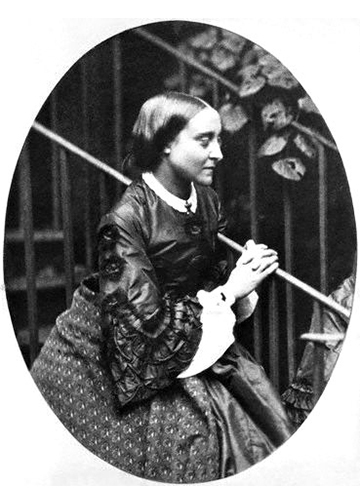Christina Rossetti. “The World” from The Goblin Market and Other Poems. Cambridge, London: Macmillan and Co., 1862.
Dr. Antony H. Harrison, Distinguished Professor and Head, Department of English, North Carolina State University, and author of several books on Christina Rossetti, recommends this sonnet as one of his favorite. Rossetti uses the Petrachan sonnet, usually a device for expressing erotic love and seduction, to express the temptation of erotic sin in the world. She rejects the traditional role of the Petrachan sonnet along with the traditional role of erotic love.
Christina Georgina Rossetti was one of four children born to Italian parents who were exiled from Italy. Rossetti was educated at home by her mother and began composing before she could write. By the age of twelve, Rossetti had written and dated poetry in her notebooks, which was privately published by her grandfather. Her brother Dante Gabriel Rossetti was a famous Pre-Raphaelite painter, and Christina sat for several of his paintings. Christina primarily wrote poetry and is best known for her symbolic religious works. Two of her poems, “Love Came Down at Christmas” and “In the Bleak Midwinter” were set to music and even today are popular Christmas carols.
The ABL has ten volumes written by Christina Rossetti and published during her lifetime. One of the books, Goblin Market and Other Poems, was part of Robert Browning’s library.The frontispiece and vignette title page were illustrated by Christina’s brother, Dante Gabriel Rossetti. The ABL’s advance copy of this work was sent to Robert Browning by the Rossetti family and remained in his library until his death.
Christina Rossetti. Goblin Market and Other Poems. Cambridge, London: Macmillan and Co., 1862.
The ABL also owns one letter from Christina Rossetti to Robert Browning. In this letter Christina asks Browning to dinner and sends her Mother’s compliments: “May we hope that you will again help us to as pleasant an evening as we have not forgotten?”
Letter from Christina Rossetti to Robert Browning.
[21 December 1868].


